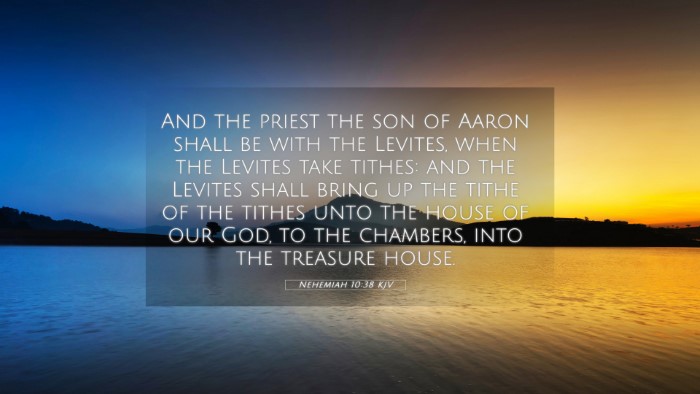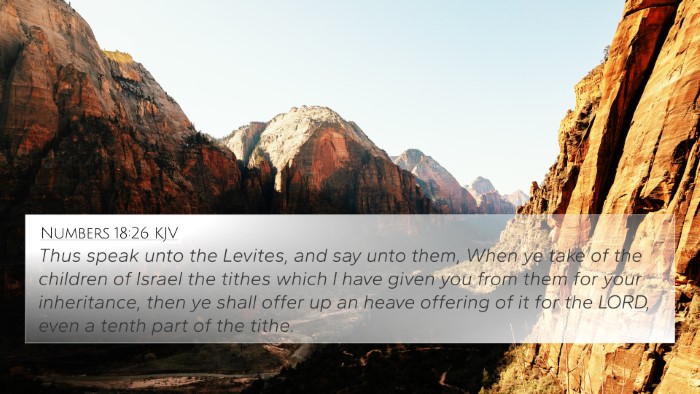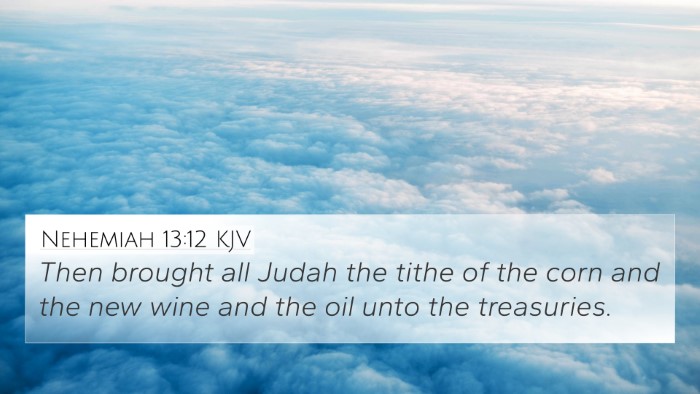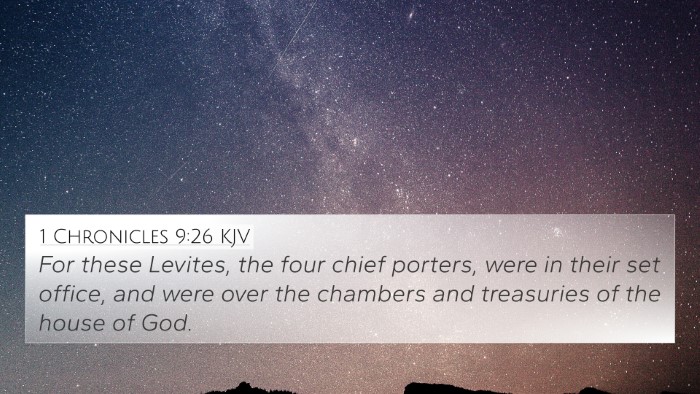Understanding Nehemiah 10:38
Verse Context: Nehemiah 10:38 states, “And the priest, the son of Aaron, shall be with the Levites, when the Levites take tithes: and the Levites shall bring up the tithe of the tithes unto the house of our God, to the chambers, into the treasure house.” This verse is part of the covenant renewal where the people of Israel committed themselves to various obligations in service to God.
Key Themes in Nehemiah 10:38
- Priestly Roles: The verse signifies the important role of the priests in the community, ensuring that tithes are properly managed.
- Tithing Practice: It highlights the religious and communal duty of tithing, illustrating the support for the Levites and the Temple.
- Community Responsibility: This verse represents the collective responsibility towards God’s house and service.
Commentary Insights
Matthew Henry’s Commentary: Henry emphasizes the importance of the Levites and priests in the structure of worship and the distribution of resources within Israelite society. He states that it was essential for the Levites to receive support through tithes so they could fully devote themselves to their sacred duties without the distraction of secular labor.
Albert Barnes’ Notes: Barnes elaborates on the law regarding tithing and how it was intended to maintain the sanctity and operations of the religious institutions. He draws a connection between the Levites' spiritual duties and their sustenance through the tithes collected, underscoring the significance of economic support for the religious leaders.
Adam Clarke’s Commentary: Clarke stresses the importance of order and hierarchy established in the governance of Israel’s worship system. He notes that the bringing of tithes to the chambers reflects organized stewardship and divine ownership of resources, indicating that all things belong to God.
Bible Verse Cross-References
Nehemiah 10:38 connects with several other biblical texts that elaborate on themes of tithing, communal responsibility, and priestly duties:
- Leviticus 27:30-32: Discusses the law of tithes and the importance of giving a tenth of one’s produce to the Lord.
- Numbers 18:26: States that the Levites shall receive tithe from the people in return for their service.
- Malachi 3:10: Encourages bringing the whole tithe into the storehouse, reinforcing the practice that supports God’s temple.
- 1 Corinthians 9:13-14: Paul mentions that those who preach the gospel are entitled to make a living from the gospel, paralleling the sustenance of Levites from tithes.
- Hebrews 7:5: Highlights the tithe as an ongoing practice, linking Melchizedek and Levi in regard to offerings narrated in the Old Testament.
- Deuteronomy 14:22-29: Provides further instructions on tithes and their purpose within the community.
- 2 Chronicles 31:5: Explains how the people generously gave tithes, spreading wealth and contributing to the Temple’s needs.
- Luke 18:12: The Pharisee’s prayer showcases the cultural significance of tithing within the Israelite community.
Thematic Bible Verse Connections
This verse encourages an exploration of the systematic approach to tithing, establishing a clear link between religion and resource management in the Old Testament. This creates thematic connections across various scriptures regarding stewardship, faithfulness, and divine provision.
Cross-Referencing Bible Study Methods
Using Nehemiah 10:38, one can effectively engage in cross-referencing Bible study by:
- Identifying key themes: Recognizing the theme of tithing and community service.
- Comparative analysis: Examining how various scriptures approach the topic of priestly duties and communal responsibilities.
- Character studies: Focusing on the roles of the Levites and priests in the context of God’s covenant with Israel.
- Contextual exploration: Understanding the historical context of the Israelites’ return from exile and their commitment to worship.
- Thematic connections: Drawing parallels with New Testament teachings about generosity and support for the ministry.
Inter-Biblical Dialogue
Nehemiah 10:38 fosters an exciting discourse between Old and New Testament themes regarding the responsibility of the faithful to support their leaders and the worship of God. It encourages exploring how practices like tithing evolve and remain pertinent throughout biblical history, offering insights for contemporary religious practices.
Conclusion
In understanding Nehemiah 10:38, we see a clear mandate for the people of Israel to maintain an organized approach to worship through tithing. This verse and its corresponding commentaries remind us of the sacred duty to support those who lead us in spiritual endeavors and the importance of a structured community dedicated to God’s service. For those seeking deeper insights, engaging in prayerful study and utilizing tools for Bible cross-referencing will facilitate richer interpretations and applications of these principles in daily life.






